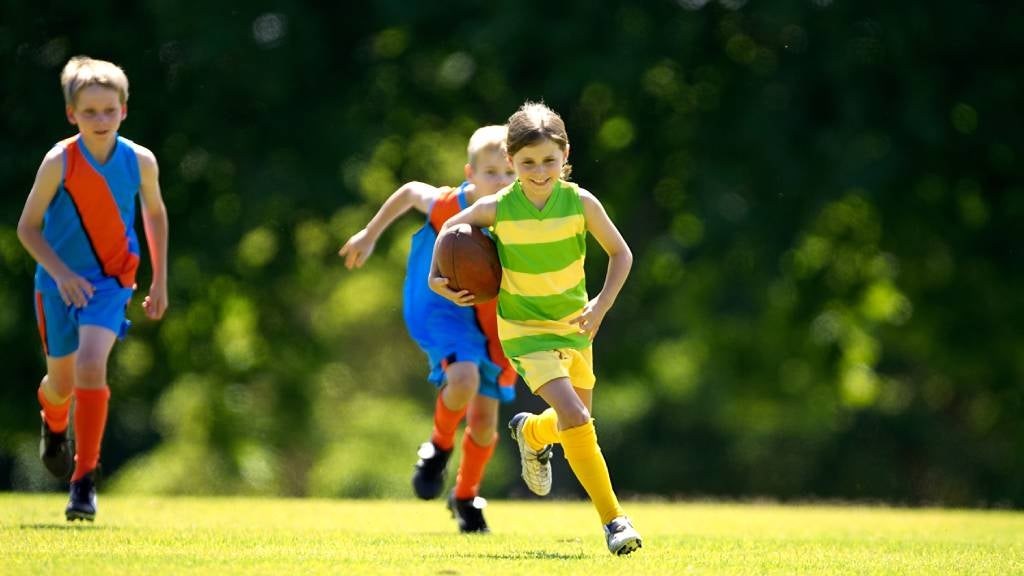Child psychologists tackle sports anxiety

For many Australians, the weekly routine of being driven to swimming or soccer practice was a quintessential part of their childhood. The Real Healthy Kids Report reveals that 71% of children regularly participate in sporting activities, with a range of physical and health benefits from increased confidence and energy to a sense of teamwork and belonging.
However, studies have also shown that childhood anxiety is on the rise – potentially affecting as many as one in five primary school aged children, with mental health being a top concern for parents. Unfortunately, a focus on sports can also be an anxiety trigger for some kids.
We spoke to clinical psychologists Dr Carly Dober, from Enriching Lives Psychology, and Dr Corrie Ackland, from the Sydney Phobia Clinic, about strategies to help kids with sports anxiety.
Signs of anxiety in children
Dr Ackland emphasises that, when it comes to participating in any sort of game or competition, a normal level of performance anxiety is to be expected.
“This is akin to a nervous energy or excited anticipation which usually improves the child’s performance by focusing their attention,” she says.
“However, when anxiety rises above this level, it can become detrimental to the child’s wellbeing, self-esteem, as well as performance,” Dr Ackland adds.
Anxiety can manifest in physical body sensations, with symptoms including:
- shaking
- faster breathing
- tummy upsets
- headaches
- feeling warm
- using the toilet a lot
- panic attacks
Other signs of childhood sports anxiety is when a child is making excuses to avoid training or competing, catastrophising the consequences of making a mistake, or showing overall emotional instability.
Dr Dober explains: “They might start asking you questions about performance and be worrying more in general. They may also have behavioural issues like acting out, fighting with their friends or siblings, and being quicker to tears than usual.”
How kids can overcome sports anxiety
Setting realistic goals
An important way to help your child build confidence is to set specific goals for their sports activities. It’s essential to celebrate their successes along the way, no matter how small they may be.
Remember, these goals must be achievable for them – whether it’s scoring a certain number of points or beating their previous time in a race. The idea is that they are making progress on their own terms rather than comparing themselves to others.
Training and preparation
The way to improve a child’s sports performance is to encourage them to practise, practise, practise – but it must be fun and relevant.
A good way to start is by training in a safe supportive environment, such as at home – without the pressure of being watched by their coach and teammates.
Visualisation or imagery scripting is another trick often used by athletes preparing for a match or competition. This involves creating a mental image of a positive outcome, such as scoring a goal or hitting a home run, which according to Dr Dober, can also be helpful for children.
“Imagery scripting and visualisation can be a helpful tool for children to imagine themselves doing the feared activity and succeeding at it. This looks like you’re coaching them to close their eyes and be calm and imagine them winning the game, or playing a really fun and successful match and feeling confident and connected to the team when they do this,” Dr Dober explains.
Breathing techniques
Breathing exercises are a powerful mindfulness tool for reducing feelings of anxiety by helping your child focus in the present moment. You can show them how to take deep breaths – counting slowly as they inhale through their nose and exhale through their mouth.
“Encourage them to connect to all five of their senses, and to focus on what they can see around them, what they can hear, what they can feel, what they can smell, and what they can taste,” Dr Dober says.
Positive self-talk: From parents and children
For parents of anxious children, it’s important to acknowledge their feelings without dismissing or ignoring them. Positive self-talk is a way of replacing negative thoughts, such as I can’t do this, with positive affirmations like I’ll try my best and that’s enough.
Dr Dober offers strategies for reinforcing positive self-talk in kids: “Encourage them to consider how they would counsel a friend who was worried and ask if they could also follow their own advice or wisdom.
“Encourage them to also consider a different perspective: what is the worst thing that can happen if they lose a game?” she suggests.
Normalise making mistakes
One of the key lessons that children can learn from sport is that making mistakes is a completely normal experience. Throughout their lives, they’ll need resilience to bounce back when things don’t go their way.
“Kids can overcome sports anxiety by focusing less on outcome and more on effort and practice,” Dr Ackland says.
“Make sure to keep a balanced perspective by correcting any negative or unhelpful thinking about their performance when it arises,” she adds.
Encourage fun and enjoyment
While 92% of parents agree that sporting activities are an important social opportunity for their children, too often this sense of enjoyment is lost on the kids themselves. But when children are having fun, they are less likely to feel anxious or stressed.
“Focus on play and getting them to connect with fun activities, as worrying can be very exhausting for them,” Dr Dober says.
“A child’s enjoyment should be prioritised. They do not need any detailed critique and they should never be punished for or threatened in advance of their performance,” Dr Ackland adds.
What happens if the parents are causing performance anxiety?
Even when parents have the best of intentions in pushing their children towards sporting activities, they may be contributing to performance anxiety.
In fact, the Real Healthy Kids Report reveals that almost one-third of parents boast about their children’s activities turning it into a competition of sorts.
“What are the attitudes and messages that your child has picked up from you either directly or indirectly?” Dr Dober questions, “Do you have high expectations of them, and do you talk about people with terms like winners and losers?”
But Dr Ackland also cautions against over-praising your child for their successes.
“Parents should be aware that celebrating and rewarding only spectacular efforts may have the effect of children feeling pressure and feeling like they failed if they do not reach this standard,” Dr Ackland cautions.
When to reach out to a child psychologist
If you notice that your child’s worries or anxiety around playing sports is getting in the way of their overall happiness and wellbeing, then it may be worth considering taking them to a child psychologist for specialised anxiety treatment.
“Reach out for help when it appears that the anxiety they are experiencing is causing significant distress or impairing their mood, sleep, or concentration,” Dr Ackland says.
To further protect the health and wellbeing of families, Real Health Insurance provides a variety of cover options. Get a quote online today and see if health insurance might be right for your family.
13 May 2024

Dr Corrie Ackland
Clinical Director and Clinical Psychologist
Dr Corrie Ackland holds a Bachelor of Psychology (Honours) and Master of Psychology (Clinical) from Western Sydney University, and a PhD from UNSW. She has more than a decade’s worth of experience in psychology with a strong focus on severe anxiety and phobias. OCD and related concerns are also strong area of practice for Corrie, and she is also a registered supervisor, providing supervision for anxiety and OCD, as well as to training psychologists. She is involved in the development of Virtual Reality solutions for health and performance fields.